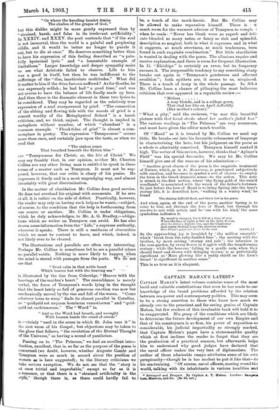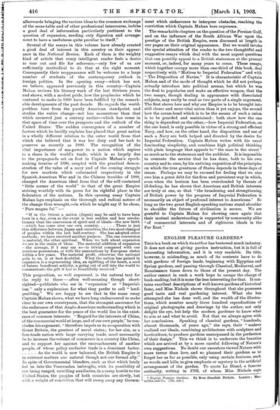CAPTAIN MAHAN'S LATEST.*
CAPTAIN MAHAN'S latest volume contains some of the most lucid and valuable contributions that even he has made to our knowledge of the broad problems afforded by the relation between sea-power and contemporary politics. This may seem to be a strong assertion to those who know how much we already owe to the prescient and far-seeing genius of Captain Mahan, but few readers of this invaluable book will hold it to be exaggerated. His grasp of the conditions which are likely to determine the future development of our own Empire and that of his countrymen is so firm, his power of exposition so considerable, his judicial impartiality so strongly marked, that Captain Mahan's pages have a statesmanlike quality which at first inclines the reader to forget that they are the production of a practical seaman, but afterwards helps him to understand why good judges have declared that the naval officer makes the very best of diplomatists. The author a these admirable essays attributes some of his own perspicacity—though he is too modest to put it like that—to his sea-training. "Of course, naval officers, moving round the world, talking with its inhabitants in various localities and Retrospect" and Prospect. By Captain A. T. Nihau. London: &wags /*Ms MAteton, and Co. Po. ed. net..1
afterwards bringing the various ideas to the common exchange of the mess-table and of other professional intercourse, imbibe a good deal of information particularly pertinent to the question of expansion, needing only digestion and arrange- ment to have a usefulness quite peculiar to itself."
Several of the essays in this volume have already created a good deal of interest in this country on their appear- ance in the National Review. Each of them is the weighty kind of article that every intelligent reader feels a desire
to tear out and file for reference,—only few of us are sufficiently methodical to do that at the right moment.
Consequently their reappearance will be welcome to a large number of students of the contemporary outlook in foreign politics. In the opening essay—which has not, we believe, appeared previously in this country—Captain Mahan reviews his literary work of the last thirteen years, and shows, with a modest pride, how the prophecies which he ventured to make in 1890 have been fulfilled by the remark- able developments of the past decade. He regards the world- problem here from the purely American standpoint, and studies the entire change—not less momentous than that which occurred just a century earlier—which has come in that space of time over the prospects and the outlook of the United States. The sudden convergence of a number of factors which he lucidly explains has placed that great nation in a wholly different relation to the outer world from that
which she believed that it was her duty and her task to preserve as recently as 1890. The recognition of the vital importance of sea-power to a nation which aspires to a share in the world's trade, which is so largely due to the propaganda set on foot in Captain Mahan's epoch- making treatise of 1890, coupled with the practical demon-
stration of the value of a navy and of the coming struggle for new markets which culminated respectively in the Spanish-American War and in the Chinese troubles of 1900, changed the American ideal from that of the self-contained "little corner of the world" to that of the great Empire striving worthily with its peers for its rightful place in the federation of the nations. In this opening essay Captain Mahan lays emphasis on the thorough and radical nature of the change thus wrought,—in which he might say if he chose, "Pars magna. fui " :—
" If in the Orient a nation (Japan) may be said to have been born in a day, even so the event is less sudden and less revolu- tionary than the conversion of spirit and of ideals—the new birth
—which has come over our own country There is just this difference between Japan and ourselves, the two most changed of peoples within the last half-century. She has adopted other methods; we have received another purpose. The one conversion is material, the other spiritual. When we talk about expansion we are in the realm of ideas. The material addition of expansion —the acreage, if I may say so—is trivial compared with our previous possessions, or with the annexations by European states within a few years. The material profit, otherwise the national gain to us, is at best doubtful. What the nation has gained in expansion is a regenerating idea, an uplifting of the heart, a seed of future beneficent activity, a going out of self into the world to communicate the gift it has so bountifully received."
This proposition, so well expressed, is the natural text for the reply to those — often well-meaning though short- sighted—publicists who see in "expansion" or " Imperial- ism " only a euphemism for what they prefer to call "land- grabbing." We are happy to see that in the same essay Captain Mahan shows, what we have long endeavoured to make clear to our own countrymen, that the strongest assurance for the endurance of that Anglo-American understanding which is the best guarantee for the peace of the world lies in the exist- ence of common interests. "Regard for the interests of China, of the commercial world at large, and of our own people," he con- cludes his argument, "therefore impels us to co-operation with
Great Britain, the greatest of naval states ; for her aim, as a free-trade nation with large carrying trade, must necessarily be to increase the volume of commerce in a country like China, and to support her against the encroachments of another people, of whose policy exclusive trade is a dominant factor.
As the world is now balanced, the British Empire is in external matters our natural though not our formal ally." In spite of Governmental blunders, such as that which lately led us into the Venezuelan imbroglio, with its possibility of our being ranged, unwilling auxiliaries, in a camp hostile to the United States, the peoples of both countries are slowly, but with a weight of conviction that will sweep away any Govern- ment which endeavours to interpose obstacles, reaching the conviction which Captain Mahan here expresses.
. The remarkable chapters on the question of the Persian Gulf, and on the influence of the South African War upon the prestige of the British Empire, were discussed at' length in our pages on their original appearance. But we would invoke the special attention of the reader to the two thoughtful and suggestive essays which deal with the most urgent questions that can possibly appeal to a British statesman at the present moment, or, indeed, for many years to come. These essays, which together occupy more than one-third of this book, deal respectively with "Motives to Imperial Federation" and with "The Disposition of Navies." It is characteristic of Captain Mahan and of the mode of thought which he did not perhaps actually introduce into political arenas, but which he was the first to popularise and make an effective weapon, that the two essays, though dealing in appearance with dissociated subjects, may really be read as two parts of a single argument The first shows bow and why our Empire is to be brought into still closer and more vital union than it yet enjoys, the second how the ocean-bond which is to be the means of such a union is to be guarded and maintained : both show how the one thing is dependent on the other,—how Imperial Federation, on the one hand, is only possible in virtue of a strong and efficient Navy, and how, on the other hand, the disposition and use of such a Navy are both helped and directed by the desire for Imperial Federation. Captain Mahan writes with his usual fascinating simplicity, and combines high political thinking with plain language that appeals to "the man in the street" as much as to the statesman and the publicist. It is impossible to overrate the service that he has done, both to his own country and to ours, by his untiring exposition of the principles on which the true greatness of States depends in these days of steam. Perhaps we may be excused for feeling that we also owe him a great debt for the firm and persistent way in which, even when the horizon has been overclouded by threats of ill-feeling, he has shown that American and British interests are truly at one, so that "the broadening and strengthening of British power by the progress of Imperial Federation is necessarily an object of profound interest to Americans." So long as the two great English-speaking nations stand shoulder to shoulder the future of civilisation is secure. We are grateful to Captain Mahan for showing once again that their mutual understanding is supported by community alike "of commercial interests and of righteous ideals in the Far East."











































 Previous page
Previous page